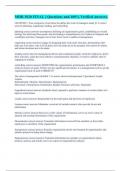MHR 3020 FINAL || Questions and 100% Verified Answers.
CHAPTER 1: Four categories of activities the define the work of managers under §1.2 correct
answers planning, organizing, leading, and controlling
planning correct answers encompasses defining an organization's goals, establishing an overall
strategy for achieving those goals, and developing a comprehensive set of plans to integrate and
coordinate activities. managers move from lower-level to midlevel management
organizing correct answers engage in designing their work unit's structure. determining what
tasks are to be done, who is to do them, how the tasks are to be grouped, who reports to whom,
and where decisions are to be made.
leading correct answers management directs and coordinates people. motivate employees, direct
their activities, select the most effective communication channels, or resolve conflicts, they're
engaging in leading.
controlling correct answers MONITORS the organization's performance and COMPARES it
with previously set goals. If there are any significant deviations, it is management's job to get the
organization back on track CORRECTS
The roles of management (Exhibit 1-1) correct answers Interpersonal- Figurehead, Leader,
Liaison
Informational- Monitor, Disseminator, Spokesperson
Decisional- Entrepreneur, Disturbance handler, Resource allocator, Negotiator
Figurehead correct answers Symbolic head; required to perform a number of routine duties of a
legal or social nature
Leader correct answers Responsible for the motivation and direction of employees
Liaison correct answers Maintains a network of outside contacts who provide favors and
information
Monitor correct answers Receives a wide variety of information; serves as nerve center of
internal and external information of the organization
Disseminator correct answers Transmits information received from outsiders or from other
employees to members of the organization
Entrepreneur correct answers Searches organization and its environment for opportunities and
initiates projects to bring about change
Spokesperson correct answers Transmits information to outsiders on organization's plans,
policies, actions, and results; serves as expert on organization's industry
, Disturbance handler correct answers Responsible for corrective action when organization faces
important, unexpected disturbances
Resource allocator correct answers Makes or approves significant organizational decisions
Negotiator correct answers Responsible for representing the organization at major negotiations
Organizational behavior correct answers investigates the impact that individuals, groups, and
structure have on behavior within an organization, and it applies that knowledge to make
organizations work more effectively.
nature of systematic study on pg. 11 correct answers looking at relationships, attempting to
attribute causes and effects, and basing our conclusions on scientific evidence—that is, on data
gathered under controlled conditions and measured and interpreted in a rigorous manner.
Behavior generally is predictable if we know how the person perceived the situation and what is
important to him or her.
Outcomes of organizational behavior correct answers Attitudes and stress, Task performance,
Organizational citizenship behavior, Withdrawal behavior, Group cohesion, Group functioning,
Productivity, Survival
attitudes (Exhibit 3-1) correct answers 3 components: cognition, affect, and behavior.2 The
statement "My pay is low" is a cognitive component of an attitude—a description of or belief in
the way things are. It sets the stage for the more critical part of an attitude—its affective
component. Affect is the emotional or feeling segment of an attitude reflected in the statement, "I
am angry over how little I'm paid." Affect can lead to behavioral outcomes. The behavioral
component of an attitude describes an intention to behave a certain way toward someone or
something—as in, "I'm going to look for another job that pays better."
attitudes (Exhibit 3-1) correct answers 3 components: cognition, affect, and behavior. The
statement "My pay is low" is a cognitive component of an attitude—a description of or belief in
the way things are. It sets the stage for the more critical part of an attitude—its affective
component. Affect is the emotional or feeling segment of an attitude reflected in the statement, "I
am angry over how little I'm paid." Affect can lead to behavioral outcomes. The behavioral
component of an attitude describes an intention to behave a certain way toward someone or
something—as in, "I'm going to look for another job that pays better."
employee's responses to job satisfaction and dissatisfaction correct answers Evaluation -Feelings
- Behavior = Performance. Job Satisfaction- Degree to which a person identifies with a job,
actively participates in it, and considers performance important to self-worth. Job
Dissatisfaction- Exit, Voice, Loyalty, Neglect
personality correct answers as the sum of ways in which an individual reacts to and interacts with
others.




